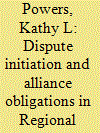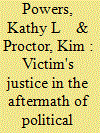| Srl | Item |
| 1 |
ID:
113820


|
|
|
|
|
| Publication |
2012.
|
| Summary/Abstract |
In analyzing peace processes in postconflict societies, scholars have primarily focused on the impact of prosecutions, truth-telling efforts, and reconciliation strategies, while overlooking the importance of individual demands for reparations. The authors argue that normative explanations of why reparations are granted in the aftermath of regime change are useful in understanding a need for reconciliation, but inadequate for explaining victim demands for compensation. The authors extend this research to study civil war settlement. In the aftermath of civil war, when some form of reparation is offered giving individuals the opportunity to seek redress of grievances, what types of loss and political and socioeconomic characteristics are likely to lead some individuals to apply for reparations but not others? Using primary data, collected through a public opinion survey in Nepal, the authors investigate individual-level demand for reparations. The findings suggest that understanding loss and risk factors may be important to civil war settlement and reconciliation.
|
|
|
|
|
|
|
|
|
|
|
|
|
|
|
|
| 2 |
ID:
072704


|
|
|
|
|
| Publication |
2006.
|
| Summary/Abstract |
States increasingly incorporate alliance obligations into the design of multilateral trade agreements to deter aggression. Regional economic institutions (REIs) are such an example. This policy activity raises the question of whether REI military alliance obligations send signals and function as institutional constraints that deter aggression. Hypotheses regarding the influence of (1) shared REI military alliance obligations on dispute initiation and (2) REI military alliance obligations on whether a potential challenger will initiate a militarized dispute against a potential target are tested. African REIs, states, and their dispute initiations from 1950 to 2000 compose the sample. Logit analysis of time-series, cross-section data is the method employed. African REI military alliances are an example of African international relations' exceptionalism and innovation in institutional design. Findings suggest African REI military alliance obligations reduce the propensity for aggression between member-states and reduce the likelihood that a potential challenger will attack a potential target and a potential target will be the object of attack. The evidence in this article indicates that such commitments reduce dispute initiation among African states.
|
|
|
|
|
|
|
|
|
|
|
|
|
|
|
|
| 3 |
ID:
159566


|
|
|
|
|
| Summary/Abstract |
Governments often award reparations to victims of mass human rights violations (HRVs) committed during political violence. Although international law requires that governments compensate victims of such violations, some states award reparations while others do not. This paper provides the first global analysis of the determinants of state reparations awards to victims of HRVs. Analyses consider the effects of multiple factors on reparations awards, whether a country has used other types of transitional justice mechanisms, economic development, and regime type. Spatial and rare events logit analyses on a new database for all countries between 1969 and 2006 suggest that wealthy, democratic countries as well as governments that already employ other transitional justice mechanisms are more likely to actually pay reparations to victims than are other governments.
|
|
|
|
|
|
|
|
|
|
|
|
|
|
|
|